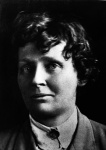
Divisions
- Home
- Tasmanian Government Policy and Programs
- Women's organisations to join
- Information and resources
- Tasmanian Honour Roll of Women
Contact Details
By phone
Find the number of a specific division or office to contact them directly or call Service Tasmania on 1300 135 513.
Our staff
Use the Tasmanian Government Directory to find staff contact details
Ettie Annie Rout


Awarded for service to Health
Born: 24 February 1877
Died: 17 September 1936
Entered on roll: 2008
The family migrated to New Zealand in the 1880s and William opened a hardware shop in Wellington. Unfortunate business decisions led to bankruptcy and Ettie needed to earn a living to help support the family. An extremely intelligent and physically fit young woman, Ettie attended Charles Gilby’s shorthand and typing classes in the 1890s, where she excelled. She set up her own shorthand typing business and became a government shorthand writer, recording court cases and commissions of enquiry.
Ettie developed radical ideas early. She became a vegetarian, a committed socialist, a physical culturist, an unorthodox dresser, a publicist and fighter for many causes, and a woman who expressed her opinions freely and often. Many of her opinions were regarded as outrageous, but are commonly held views in today's society. In a letter to her friend, H.G. Wells, she said: "It’s a mixed blessing to be born too soon".
It was Ettie’s contribution to the health and wellbeing of New Zealand and Australian soldiers in World War I that makes her so deserving of recognition and remembrance. During the Gallipoli campaign in 1915, she set up the New Zealand Volunteer Sisterhood and invited women aged 30 to 50 to Egypt to care for New Zealand soldiers. Despite government opposition, the first group of 12 volunteers went to Cairo in October 1915.
When Ettie arrived in Egypt in 1916, she became aware of the high venereal disease rate amongst soldiers and directed her formidable talents to doing something about it. The Australian Dermatological Hospital in Egypt was treating both Australian and New Zealand soldiers, and at one stage was receiving 250 new venereal disease patients a day. Many soldiers were hospitalised with venereal diseases without ever having engaged in battle.
Ettie was angered by the lack of any official action, with the traditional response being to either ignore it, or call on the soldiers to practice chastity. She embarked on a campaign of letter writing to Members of Parliament, newspapers and anyone she thought may be able to act on the problem. Her letters were eventually banned from New Zealand newspapers under the war regulations as many groups, notably women’s organisations, objected to her stance on the issue.
Unlike many people, Ettie saw the problem as medical, not moral, and realised that appealing to soldiers to practice abstinence from sex would not work. Ettie carried out research in England among the foremost doctors in the field of venereal disease, and combined the work of several to produce her own preventative kit, containing calomel ointment, condoms and Condy’s crystals. She sold these at the New Zealand Medical Soldiers Club, which she set up at Hornchurch near the New Zealand Convalescent Hospital.
Ettie also advocated the establishment of safe sex brothels, but had no success convincing authorities. Her solution to the venereal disease problem - proper sex education, free prophylactic kits and safe sex brothels - was eminently sensible, but way ahead of her era. Women’s groups in New Zealand were outraged, accusing Ettie of trying to make ‘vice’ safe.
Ettie’s constant lobbying paid off. By the end of 1917, the New Zealand Expeditionary Force had adopted her kit for free and compulsory distribution to soldiers going on leave. The New Zealand Government gave Ettie no recognition for her role in the kit’s development and adoption.
In April 1918, Ettie went to Paris and set up a safe sex brothel, as brothels were legal in France but not in England. She met troops as they arrived from the front and handed out cards recommending the brothel of Madame Yvonne, who had agreed to run her establishment with safe sex practices. Ettie’s operation in Paris amounted to a complete social and sexual welfare service for ANZAC soldiers who lined up each day to seek her advice on a wide variety of issues. The French Government decorated her with the Médaille de la Reconnaissance Française which was awarded to civilians for works of benevolence at home or abroad, for her work in Paris and in Villers Brettoneux, where she ran a Red Cross depot from 1919 to 1920.
After the war, Ettie lived in England, where she married long-time friend, Fred Hornibrook, and published books on safe marriage, health, vegetarianism and what is regarded as a largely inaccurate book on Maori culture. She returned to New Zealand in 1936 after her marriage failed, but was not received well by former friends and colleagues. Ettie took an overdose of quinine aboard ship in 1936, having sent out telegrams saying “Ettie died at sea”.
The life of this remarkable woman has been captured by Jane Tolerton in her biography Ettie: A Life of Ettie Rout – ‘Guardian Angel’ or ‘Wickedest Woman’?
Photograph reproduced with permission of the Alexander Turnbull Library, Wellington, New Zealand Ref. No. PAColl-4832.
 Tasmanian Honour Roll of Women
Tasmanian Honour Roll of Women